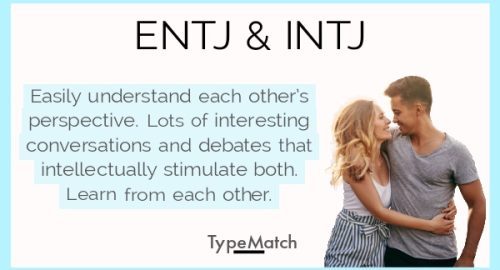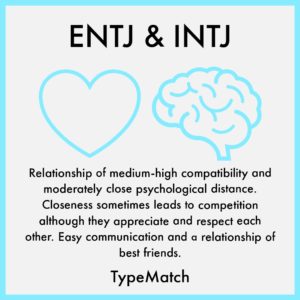ENTJ and INTJ Relationship
Are ENTJ and INTJ Relationships Compatible?
In ENTJ and INTJ relationships, they easily understand each other and have lots of intellectually stimulating conversations. In the TypeMatch dating and friendship app, we assign this pair a medium-high compatibility score. Below we will explain the positive and negatives of this relationship pairing as well as our advice.
Attraction
The ENTJ and INTJ relationship is unique in that it’s probably one of the few that can stimulate each other’s creativity. However, this doesn’t mean that the ENTJ and INTJ don’t have a solid emotional connection. It is because these types are usually drawn to intellectual pursuits and don’t often feel the need for emotional intimacy.
While ENTJ and INTJ relationships may find the debate interesting to start with, too much of that can lead the relationship to have a sense of disillusionment. They complement each other in their shared strengths but leave half of the world unexplored. They support each other’s attempts to confront their demons but usually remain one-sided, regularly returning to their comfort zone.
The intellectual stimulation and surprise involved in ENTJ INTJ relationships typically make for a stable and friendly relationship over a long period. Thus, an ENTJ INTJ relationship is often one between friends.
Communication
Usually, ENTJs and INTJs quickly realize that they think alike, and the differences in their understanding help them learn more about each other and themselves. Because each partner can see only half of the issue, they are always interested in what the other partner thinks. Immediately, the two partners find plenty of things to talk about. They readily understand each other’s philosophies on basically all issues.
Later, their differences may become more of an obstacle as the relationship gets closer. ENTJ and INTJ relations often provide each other with helpful perspectives and advice. Although, this help is not always practical as the two types can have difficulty understanding each other’s weaker points as they share the same ones.
ENTJ and INTJ relations favor discussions of everyday matters of interest and solvable problems. They usually have an exchange of views that is interesting for both and evenly balanced. Over time, they may feel a sense of growing intellectual competition with each other. It can eventually lead one partner to disengage entirely.
Follow-up discussions on the same topic often become increasingly controversial and disorienting. The ENTJ and INTJ might try to handle and remove all the differences, but this is unattainable. Usually, conversations are friendly and do not deteriorate associations.

ENTJ & INTJ Relationship
ENTJ and INTJ couples tend to see the best in each other. They are proud of their partner’s accomplishments and will comfort them when feeling down. Being in a relationship with one’s reflection type can be difficult. Although it may seem pleasing to understand their partner so well, it can lead to some problems. For example, ENTJ and INTJ partners sometimes lack passion and may try to control or impose their views rather than learn from one another. As a result, they may get on each other’s nerves with enough closeness.
One of the hallmarks of a close relationship is the ability to point out another person’s blind spots. It can arrive in the state of proposing feedback or, in the case of a relationship, simply being honest about things that bother them. As a result, an ENTJ INTJ relationship can be complicated because each person always tries to change and improve the other. Having a friend there can make things more pleasant because that person can act as a mediator between the two, constantly trying to change each other. A lot of the information exchanged between partners happens through their vital functions. Essentially, one partner will think of something, and the other will already be doing it.
Luckily, any tension that may arise for ENTJ and INTJ partners is often quickly resolved by simply creating some distance. Confrontation is rarely necessary, and if it does happen, it’s quickly forgotten.
Partnership
ENTJs and INTJs share common interests but may differ slightly in their thought processes and procedures. As a result, they may have a slightly different perspective on the same problem. Usually, this relationship is useful for solving professional and creative problems if partners work together in the same field.
With this couple, there are many possibilities for them to either help or hurt each other. Thankfully, it’s usually the former that gets realized. However, in a romantic relationship like a marriage, they find it difficult to help and care for each other.
Our Advice For ENTJs and INTJs
For successful communication in an ENTJ and INTJ relationship, it is best to have a plan, schedule, or agreement to get along. That way, both partners can know what to expect and when things need to get done. Once they have a system that works, it’s usually best not to change it since this can lead to confusion. Usually, both partners will need to agree about the event, even if there are debates about details. It’s best for people in this type of relationship to communicate directly. It’s also essential to subject any critical life events to logical analysis. Sorting out the relationship based on emotions is a common thing that couples can do. However, this may not always be the best method to use.
If you or your partner have different views on things, try to have an open mind about it. If you feel positive towards your partner, express it through kind words or thoughtful actions.
ENTJ and INTJ pairs do best when they are independent. It’s essential for them to be able to provide for themselves and avoid going into debt. Overall, these relationships are strengthened by collaborative intellectual work together.

More Resources For ENTJs & INTJs
Sources:
A.V. Bukalov, G. Boiko, “Why Saddam Hussein made a mistake, or what is Socionics”
Ekaterina Filatova “Art of understanding yourself and others”
Eugene Gorenko, Vladimir Tolstikov, “Nature of self”
I.D. Vaisband, publications on Socionics
Laima Stankevichyute “Intertype relations”
O.B. Slinko, “The key to heart – Socionics”
R.K. Sedih, “Informational psychoanalysis”
Sergei Ganin
Valentina Meged, Anatoly Ovcharov
V.V. Gulenko “Criteria of reciprocity”
V.V. Gulenko, A.V. Molodtsev, “Introduction to socionics”






